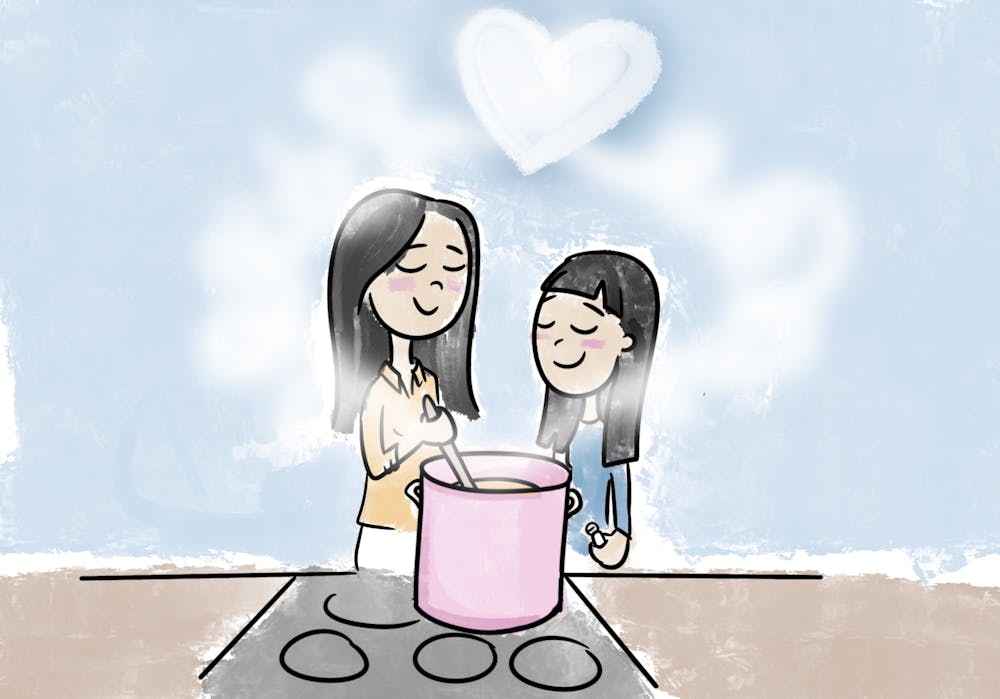My mother embraces silence. She applies the philosophy of “being seen, not heard” to nearly everything. But while she shies away from using her voice, she makes her thoughts loud and clear through a different language — cooking.
Days before guests come over, my mom prepares to welcome them with a meal, eyeing quality cuts of Japanese wagyu at the store and filling the kitchen with ingredients for an extravagant broth. When caught up in a couple's quarrel with my father, she rarely resolves the argument by saying, “I’m sorry.” Instead, she hand-peels and toasts chestnuts — his favorite snack — and waits for him to accept her soundless apology. Her decisions to offer food are not made offhandedly. For her, any meal crafted from scratch means something.
I learned how to understand my mother through her cooking. Growing up, I would watch her sit down to make dumplings, filling little squares of dough with a delicious concoction of carrots, tofu, glass noodles, meat and onions. As she folded each dumpling silently and methodically, never slowing down, I began to appreciate the hard work and heart she put into each meal.
Yet, before I fully appreciated this type of love language, I could not understand the meaning behind her voiceless expression. I remember feeling shocked when, for her birthday, my mother and her friends ended up at a sushi bar because she didn’t tell them that she actually hates sushi. Later that night, she explained how she couldn’t even finish two sushi pieces, saying the food was too slimy and mushy for her palate.
As a rather blunt and straightforward person, I saw her quietness as a weakness — I was angered by how people talked over her and exploited her hesitation to speak up. On the other hand, I blamed her for being too headstrong to voice apologies, viewing her silence as a form of stubbornness, too.
But then my mother explained to me how, for her, cooking meals is not just about nourishment — it’s a gesture of love and respect for someone she loves. She told me that when she was nine, living in South Korea in the 1980s, her father and older brother brought home a small bunny that she developed a fondness for. Every day, she would diligently feed the bunny leftover pieces of cabbage and offer it a bowl of water. Over the course of the week, she grew attached to the bunny, treating it like her first pet.
When my grandmother fell severely ill, the local apothecary advised her to eat fresh rabbit stew. My mother was forced to part with her pet rabbit, letting my grandfather use the rabbit meat to prepare the stew. She wept and refused to speak for days afterward, but she was also grateful for the stew, as she saw how it renewed my grandmother's strength. Ironically, according to my grandmother, my mother was later forced to try a bit of the broth — and she proceeded to down three bowls, proclaiming the stew was her new favorite meal.
As I laugh at the endearing irony of this story, I imagine that it was moments like this when my mother learned how to love. While she lost a beloved pet, the sacrifice also instilled a deep appreciation for cooking in her. Since then, she has treated home-cooked meals as a form of devotion to loved ones that cannot be expressed in words.
As a young child, I always thought my mother — given her heart and her temperament — was holding herself back with her quietness. Silence seemed to be a wall blocking me from understanding her. But maybe she couldn’t have loved any other way. Maybe sacrificing her hatred of sushi allowed her to see her friends happy. Maybe for her, expressing love meant making haemul-pajeon, a savory Korean pancake that she knew was my favorite meal.
So, I learned how to speak my mother’s love language by learning how to cook. I remember the first time she taught me how to dice onions — it was a disaster. But the combination of me crying from the sting of the onions and my terrible slicing technique made us both laugh uncontrollably. I am still not a great cook myself — I tend to stay on the sidelines, listening to my mother explain her recipes. But even in college, I try to cook spaghetti with my mom’s pre-made tomato sauce or follow her recipe for bulgogi, a dish made of marinated, thinly sliced beef. Even though I am cooking away from home, I feel my mother is with me, and I understand her more.
My mother is quiet, while I am blunt. She channels her emotions inward, while I wear my heart on my sleeve. Despite our different temperaments, my mother and I understand each other perfectly through the language of food. Her love is clear when I ask her to cook, and her face lights up with excitement. When she rolls back her sleeves to knead dough or soak rice cakes in water, her movements speak volumes.
Now, I see my mother’s love whenever I stretch dough in the palm of my hand, or as I pleat the edges of dumpling skin around delicate tofu filling. The sensation reminds me of how my mother pours her love into preparing meals. For her, cooking is a way of expressing love. It was a language that was once foreign to me, but now I understand it fluently.







